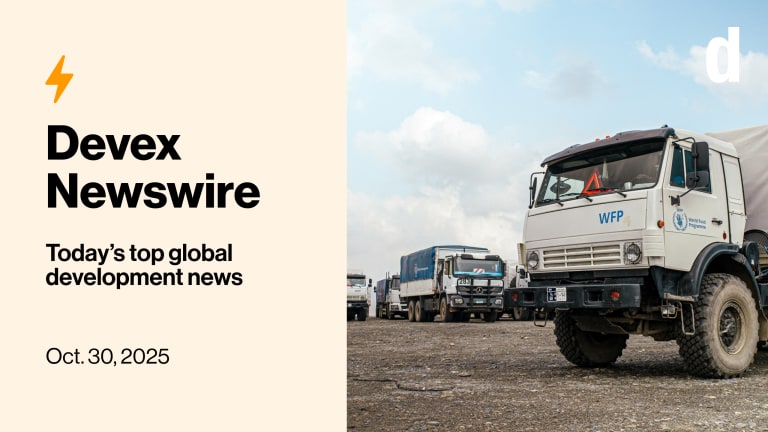
This week’s inaugural European Humanitarian Forum in Brussels saw the aid sector’s big names try to crack familiar problems like funding and impunity for international law violators, even as a major new one loomed: the global ripple effects of the war in Ukraine.
Get the inside track on how agriculture, nutrition, sustainability, and more are intersecting to remake the global food system in this weekly newsletter.
“The availability of food is going to become a heck of a problem in about six to nine months,” David Beasley, the executive director at the World Food Programme, told a panel Tuesday. “Most people don’t realize Ukraine grows enough food to feed 400 million people, and if the agricultural leaders of the world can’t compensate fast enough, if the war doesn’t end quick enough, you are going to have extraordinary conditions,” he said.
“Try quadrupling the food pricing in Sahel and Niger, in Syria, and people are not going to survive,” Beasley added. “You will have destabilization of many nations in about six to nine months from now if we don’t get ahead of it.”
He was speaking at a session on “Expanding the resource base for humanitarian aid,” one of the priorities of Janez Lenarčič, the European Union’s commissioner for crisis management, who co-hosted the forum with the French presidency of the Council of the EU.
With the 20 top public donors typically accounting for 96% of humanitarian assistance, Lenarčič has made expanding the donor base for humanitarian aid one of his priorities. Many speakers acknowledged the problem, but given the chance, few politicians or aid leaders were willing to call out who specifically they thought should be giving more.
Beasley — who made his own recent pitch on Twitter to Tesla owner Elon Musk — said billionaires should be asked to contribute one or two days’ worth of their net worth increase during the COVID-19 pandemic, while oil-producing states in the Persian Gulf should be told “oil prices are up; you need to be stepping up in ways you’ve never stepped up before.”
Another priority for Lenarčič is tackling impunity for violators of international humanitarian law. At a press conference Monday night, the Slovenian told reporters that the European Commission is looking to fund an “independent, nonpolitical entity” to systematically gather, analyze, and publish cases of violations globally.
For now, “we don’t have a full picture of the state of international humanitarian law in the world,” Lenarčič said.
“You will have destabilization of many nations in about six to nine months from now if we don’t get ahead of it.”
— David Beasley, executive director, World Food ProgrammeOverall, this first forum — which is intended to return annually — was a smorgasbord of every topic covered by the European Commission’s humanitarian aid department, from climate change and preventing gender-based violence to the humanitarian-development-peace nexus.
Amid familiar calls for greater local ownership, fewer “silos,” and greater political will, there were also novel ideas. Martin Vogt, the head of global sanctions and embargoes at Deutsche Bank, said that in terms of processing transactions for humanitarian groups in countries under sanctions — which can take months — banks could be incentivized through “some kind of recognition or reputational acknowledgement or other kind of regulatory benefit.” He likened this to the EU’s sustainable finance taxonomy, which offers a green tick to investors.
There was a dose of realpolitik too, with a ministerial session on Monday night in which a procession of European politicians took the stage to deplore Russia’s war against Ukraine.
“Courts will have to rule, but for me these are war crimes and crimes against humanity,” said German Foreign Minister Annalena Baerbock, referring to strikes against civilians.
The spring sun was shining in Brussels as conference circuit regulars got reacquainted after two years of pandemic restrictions on public gatherings. But there were also dire warnings.
Referring to supply chain stress and rising prices for fuel, food, and transport, Isobel Coleman, deputy administrator at the U.S. Agency for International Development, concluded on Tuesday that “we may look back at 2022 as the year that broke the back of the humanitarian system as we know it today.”









